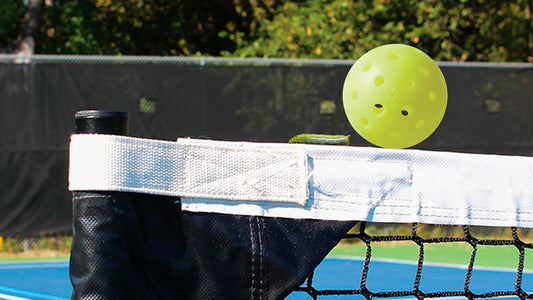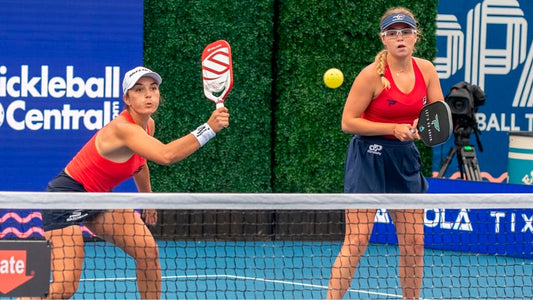
Line Calls in Pickleball: Who Gets the Final Say?
Share
“Fair play is not simply following the rules. It’s about respect, for your opponent and for the game itself.” — Unknown
Line calls in pickleball can stir up more drama than a tiebreaker in the third game. You hear it all the time. “It was in!” “No, it was out!” Suddenly, what was a friendly rally turns into a courtroom of opinions. This just happened this weekend in a game when the score was tight and the ball landed within millimeters of the line.
So, who actually makes the call? What happens when teammates disagree? And how do you handle those moments when the ball is still in play during a disputed call?
Let’s break it down so you’re not caught off guard next time a ball hits the edge of the court. Understanding who makes the call, what to do if partners disagree, and how to handle disputed points can help ensure your game stays fair, fun, and respectful.
Who Makes the Line Call?
According to the USA Pickleball Official Rulebook, line calls are made by the receiving team, the players on the side where the ball lands. That means if your opponent hits a shot that lands on or near your baseline or sideline, it’s your job to make the call, not theirs.
For non-officiated play, which includes most recreational games, this responsibility falls to the players to make the best possible call based on what they saw. You should only call a ball “out” if you clearly see it land outside the line. If any part of the ball touches the line, it is considered “in.” If you’re unsure, the benefit goes to the opponent and the ball is considered in.
What If Teammates Disagree?
Disagreements happen, especially when the ball clips the line or lands close and each player has a different viewpoint of the ball and the line. If one player calls the ball “in” and the other calls it “out,” the official rule is clear: The ball is “in.” You can only call a ball “out” if you are certain, it was out. This rule reinforces fairness and good sportsmanship. If even one player sees the ball as in, the benefit of the doubt must go to the hitter.
What If the Disputed Ball Continues in Play?
Sometimes a player makes a soft call, maybe they mutter “out” under their breath or raise their hand slightly while their teammate closer to the ball believes it’s in and ignores their teammate’s call and continues the play. This happens more often than you think, especially in fast-paced rallies.
If the call was not definitive or didn’t stop the action, and both teams keep playing, the rally stands. You can’t reverse a call after the point if play wasn’t clearly stopped. This is why it’s important to make confident and vocal calls immediately if you truly believe the ball was out.
If play does stop due to a call, but the team making the call isn't absolutely sure, the point goes to the opposing team.
Can Spectators or Sideline Players Make Line Calls?
Only players on the court or an official referee may make a line call. Even if spectators or other players standing on the sidelines saw the ball clearly, their opinion does not count in recreational or tournament play, unless they are acting as certified line judges or refs. Sideline comments, while well-intentioned, can add confusion and frustration. Line calls must come from players actively in the game or a designated official.
What About Recreational Play?
In recreational games, where the priority is more on camaraderie than competition, there’s flexibility. If a line call is disputed or unclear, like one player calls the ball “out” and the other “in,” most rec players will opt to replay the point. This keeps the game lighthearted and avoids frustration.
What’s the Best Way to Make Calls?
· Be loud and clear. Use a strong voice to call “out” immediately and decisively.
· Check with your partner when making close calls.
- Default to “in” if neither player is 100% certain.
· Respect your opponent and don’t argue if they make a call on their side that you can’t clearly dispute.
· Replay the point when doubt or confusion prevents a fair outcome.
- Don’t over-celebrate a questionable point. It’s okay to win, but don’t rub it in.
- Remember: it’s a game. Enjoy it!
The Golden Rule of Line Calls
In pickleball, the ultimate goal is not just to win points but to uphold the integrity of the game. A bad call may win you a rally, but it can cost you sportsmanship and respect. Make calls with fairness and clarity, communicate well with your partner, and know when to let a point go. Trust us. Your reputation as a fair and honest player will go a lot farther than a single disputed shot.
Game Point
Line calls in pickleball are more than being a part of the game and how you handle them. They are about teamwork, communication, and fairness—and they say a lot about how you play. When in doubt, give the benefit to your opponent. When in a disagreement, talk it through and let honesty lead. And when the game gets heated, stay cool and remember why you play in the first place.
See you on the courts!



